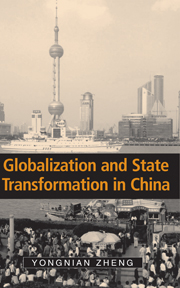Book contents
- Frontmatter
- Contents
- List of figures
- List of tables
- List of abbreviations
- Preface
- 1 Globalization: State decline or state rebuilding?
- 2 The state, leadership and globalization
- 3 Globalism, nationalism and selective importation
- 4 Power, interests, and the justification of capitalism: Constructing an interest-based political order
- 5 Bureaucratic reform and market accommodation
- 6 Building a modern economic state: Taxation, finance and enterprise system
- 7 State rebuilding, popular protest and collective action
- 8 Contending visions of the Chinese state: New Liberalism vs. the New Left
- 9 Globalization and towards a rule-based state governance?
- Notes
- Bibliography
- Index
- CAMBRIDGE ASIA-PACIFIC STUDIES
1 - Globalization: State decline or state rebuilding?
Published online by Cambridge University Press: 11 December 2009
- Frontmatter
- Contents
- List of figures
- List of tables
- List of abbreviations
- Preface
- 1 Globalization: State decline or state rebuilding?
- 2 The state, leadership and globalization
- 3 Globalism, nationalism and selective importation
- 4 Power, interests, and the justification of capitalism: Constructing an interest-based political order
- 5 Bureaucratic reform and market accommodation
- 6 Building a modern economic state: Taxation, finance and enterprise system
- 7 State rebuilding, popular protest and collective action
- 8 Contending visions of the Chinese state: New Liberalism vs. the New Left
- 9 Globalization and towards a rule-based state governance?
- Notes
- Bibliography
- Index
- CAMBRIDGE ASIA-PACIFIC STUDIES
Summary
Globalization has thrown up challenges and opportunities which all countries, especially developing ones, have to grapple with and China is no exception. In fact, China, the most populous country in this world, has globalized rapidly over the past two decades. When Deng Xiaoping opened China's door in the late 1970s, no one expected that China would be integrated into the rest of the world at such a dramatic pace. The country has transformed “from a policy of self-reliance and suspicion to one of openness and integration.” With its membership in the World Trade Organization (WTO) and other major world and regional organizations, China has become an integral part of the world community. The significance of a rapidly globalizing China has led scholars, policy consultants and policy-makers alike to pay intensive attention to the impact of China's globalization on world politics.
China's rapid globalization has been driven by capitalistic economic development. Capitalism was “illegally” pursued initially as a way of economic development after the Chinese leadership began to implement the reform and open-door policy in the late 1970s, and was legitimized only after Deng Xiaoping's southern tour in early 1992. Globalization has brought about sea changes to every aspect of economic and social life in China. Nevertheless, the Chinese state appears to have remained in its traditional Leninist form. Many questions have therefore been raised regarding the impact of globalization on the Chinese state such as: How has capitalism driven globalization?
- Type
- Chapter
- Information
- Globalization and State Transformation in China , pp. 1 - 21Publisher: Cambridge University PressPrint publication year: 2003



